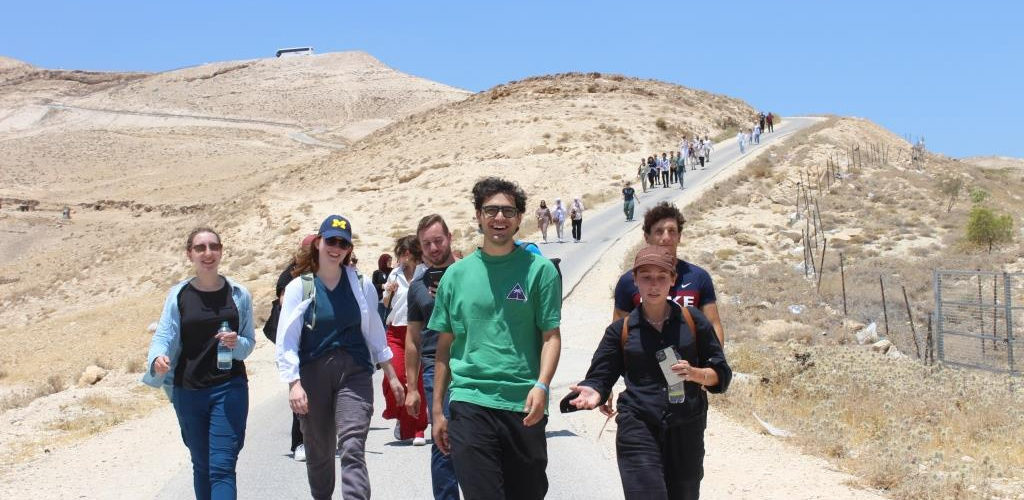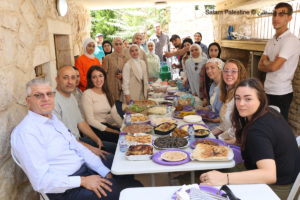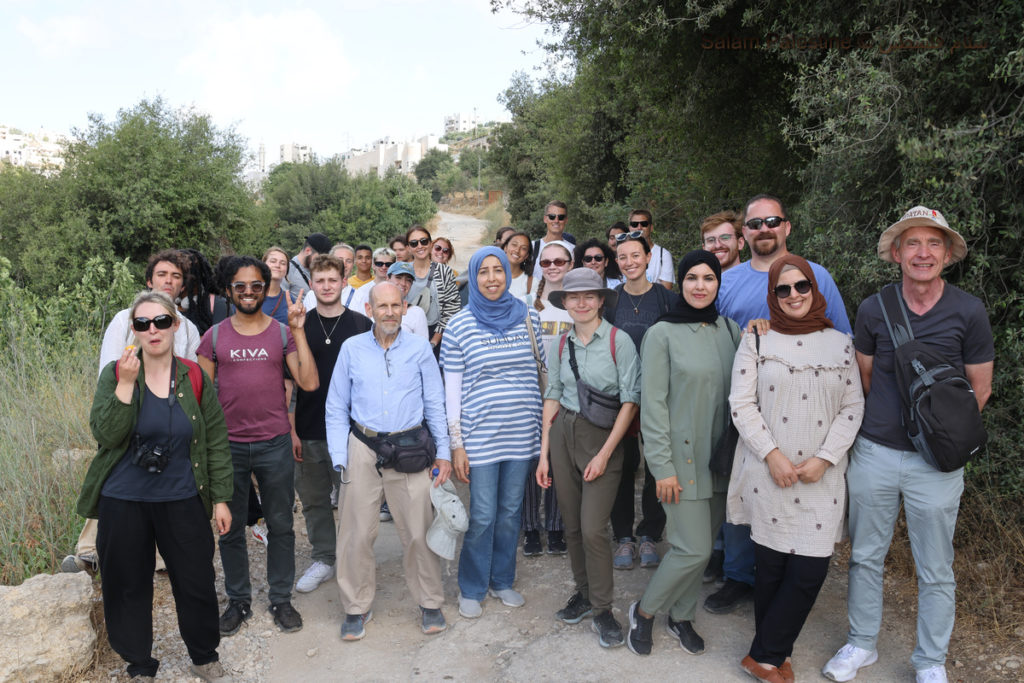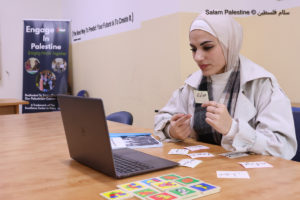The Palestinian Culture Internship Program: This program is designed to provide its participants with a first-hand view of Palestinian culture, art, history, and industry. Interns in Palestine can explore the beautiful and historic city of Hebron, take day trips to neighboring cities such as Bethlehem and Jerusalem, and explore other cultural and historical sites.
The immersive internship focuses on how participants can enhance their experience of everyday Palestinian customs, politics, and culture. This program would be ideal for a wide range of participants, whether native English speakers or not, ranging from students to young professionals and retirees, or anyone interested in Palestinian culture or the politics of the Middle East.
The program would also suit university students interested in an internship program (from 1-13 Weeks) that would be shorter than the typical semester or quarter system. Salam Palestine, through its partnership with the Palestinian Education Authority, can also provide academic credits to all participants.
The Palestinian Culture internship program is an excellent opportunity for those interested in learning Palestinian or Levantine Arabic, as they will be learning the language as part of a fully immersive linguistic experience. By participating in this program, those eager to learn Arabic will have many opportunities to speak the language daily with shopkeepers, restaurant owners, and other members of the Palestinian community right here in Hebron!
Intern in Palestinian Culture 2025/2026
Salam Palestine now accepts applications for The Palestinian Culture Internship Program for 2025/2026. This immersive program is perfect for students, professionals, retirees, and anyone passionate about exploring Palestinian culture, history, and daily life. Based in Hebron, West Bank, interns will engage with local communities, visit historic sites in cities like Bethlehem and Jerusalem, and gain firsthand experience in Palestinian traditions, art, and politics. The program offers an opportunity to deepen cultural understanding while actively participating in community activities.
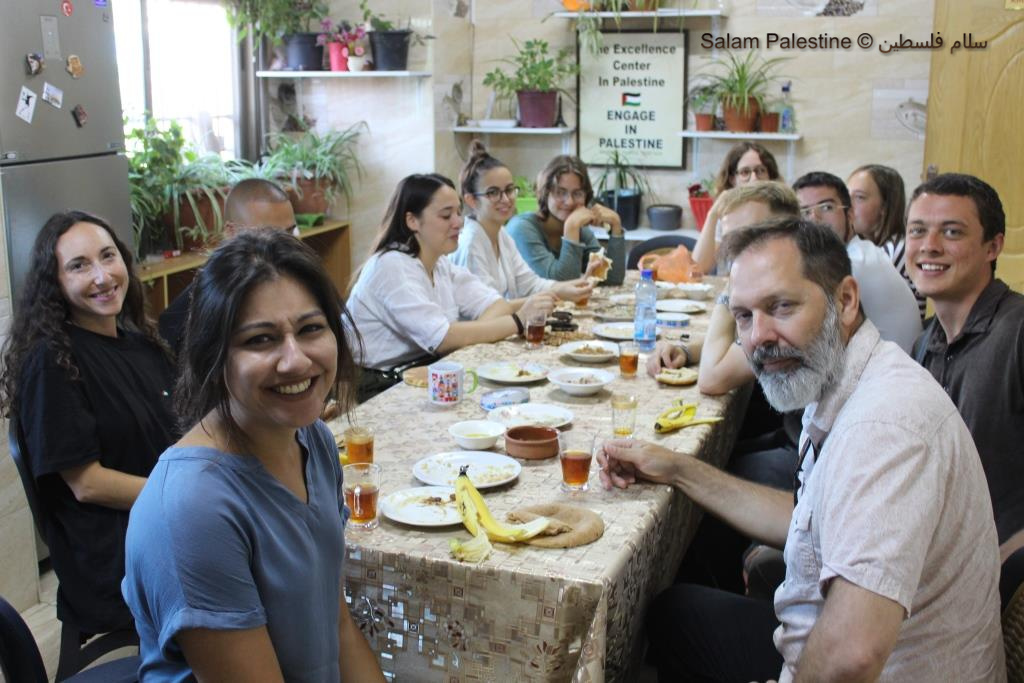
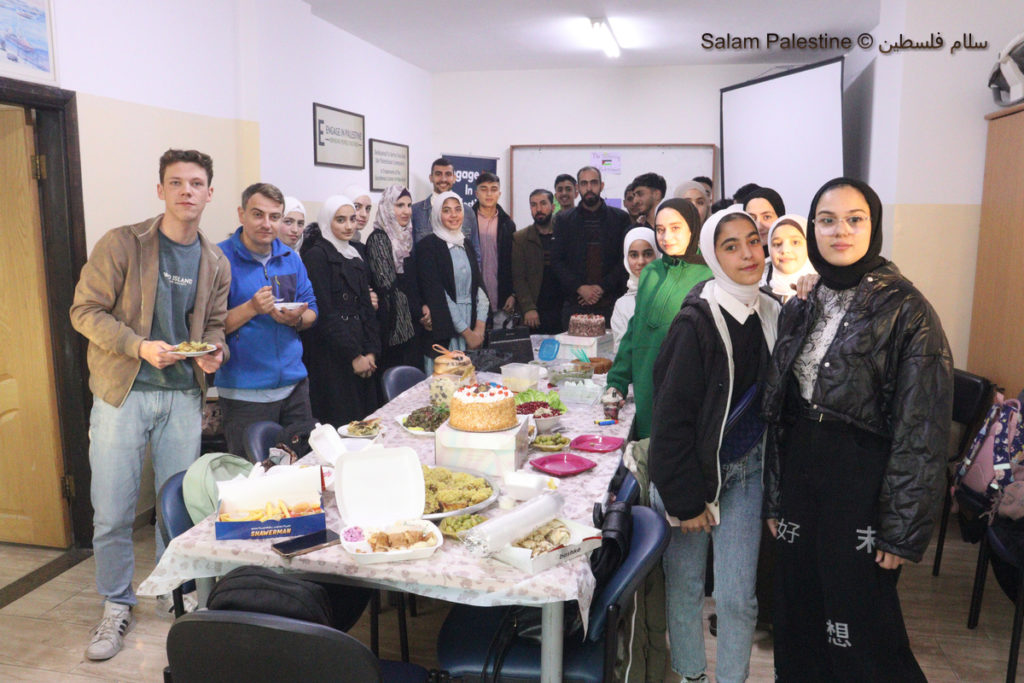
In addition to cultural immersion, interns will have the chance to study Palestinian or Levantine Arabic through a hands-on linguistic experience. Whether practicing with shopkeepers, restaurant owners, or community members, participants will develop language skills in real-life settings. This program is ideal for university students seeking an enriching short-term internship (1–13 weeks) and offers the possibility of earning academic credits through Salam Palestine’s partnership with the Palestinian Education Authority. Apply now for an unforgettable journey into Palestinian culture!
Table of Contents
Program Components
The Palestinian Culture Internship Program includes Arabic language lessons for 3 hours each week. These classes are designed to provide participants with the linguistic tools to fully embrace Palestinian culture and communicate with all sections of society. By learning Arabic, participants will be better able to speak with a wide range of Palestinians in local shops and businesses, taxis, local charity organizations, and much more. Participants need not worry about their language proficiency, however, as most Palestinians are very friendly and will be happy to see visitors from overseas are interested in their culture.
In addition to Arabic classes, female participants (and some male participants, depending on the availability of accommodation) will have the option to reside with a Palestinian host family. There are many benefits to staying with a host family, such as the daily opportunities it gives the participants to practice their Arabic by engaging in conversations. Furthermore, participants will be able to experience Palestinian cooking, customs, festivities, and family dynamics. Most importantly, participants will very likely leave the program having made lifelong friends here.
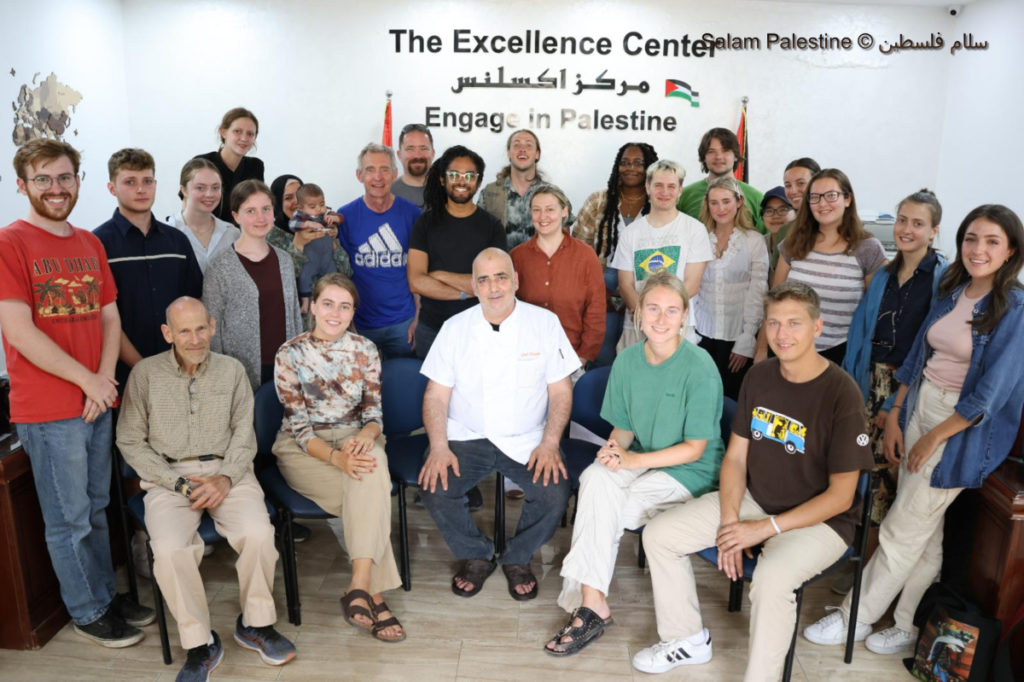
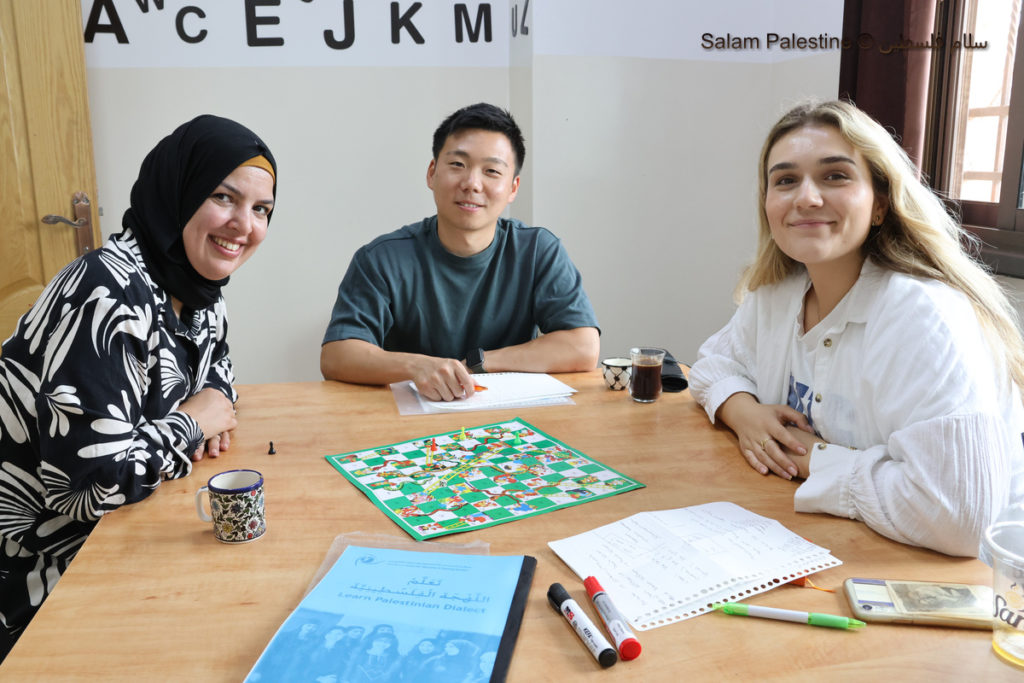
If a host family is unavailable, male program participants will have the opportunity to stay in an all-male dorm or a shared apartment in the city of Hebron.
Excursions Into Hebron
Salam Palestine operates regular excursions into Hebron to introduce participants to the city’s cultural sites, restaurants, markets, industries, museums, and religious monuments. Participants will also be able to visit local Palestinian organizations specializing in human rights issues and Palestinian law. This is to help program participants understand not only Palestine’s cultural heritage but also its political significance and domestic state of affairs.
Ultimately, this internship program is intended to bring foreign nationals into the West Bank to engage in cultural exchange with Palestine and its people. Palestinians are hospitable and welcoming, with family structures embedded in a dynamic and vibrant culture. Why not visit Palestine to learn more about its history, culture, and people?
Internship Program Components:
- 3 hours of Arabic classes per week
- Homestay with a Palestinian host family (if available)
- Center-led excursions to Hebron
- Day trips to neighboring cities in Palestine
- Meetings with human rights organizations & law workers
- Attendance at local cultural festivals
What You Will Contribute
As an intern for the Palestinian Culture Program, you will engage with and contribute to the Palestinian community of Hebron while broadening your understanding of Palestine’s culture.
Internships can benefit the Palestinian community of Hebron in many ways, such as by participants creating various programs for school and university students. Examples of these programs can include cultural information sessions, Q and A sessions, or even programs focusing on an intern’s field of study.
Furthermore, interns can create and design community development activities that utilize the center’s connections and resources. For example, interns can collaborate with local universities, NGOs, or law firms to improve Palestinians’ human rights.
In addition, interns can create constructive and educational workshops dedicated to studying culture and the humanities. In these workshops, interns can create dialogues about their respective cultures with local university students.
Finally, interns will have the option of assisting local Palestinian schools to teach English to Palestinian children. This service is of the utmost importance, as exposure to other cultures and languages is of enormous significance to children. By participating in the Palestinian Culture Internship Program, interns will learn as much about Palestinian culture as local Palestinians will learn about theirs!
Summer Internships In Palestine
Salam Palestine’s Palestinian Culture Program is also available as a summer internship for those interested in traveling to Palestine and seeking academic credits. Upon completing the program, participants will receive internship credit and a certificate verifying the internship.
As a member of the summer internship program, participants will dedicate their time to learning about Palestine’s culture and political circumstances, emphasizing the intern’s chosen field: politics, religious studies, refugee aid, community development, or any other specialization.
If you are interested in a cultural immersion and community development summer internship with Salam Palestine, do not hesitate to contact us via email, putting the phrase “Summer Palestinian Culture Internship” in the subject line. This program is an ideal opportunity for any student looking to enroll in a unique internship during their summer break.
Things To Know About Palestinian Culture
Modern-day Palestine lies at the center of the Levant, which itself lies at the central axis of the Middle East, the Mediterranean, Asia, Europe, and North Africa. Because of this unique geographical positioning in the world, Palestine’s culture has been influenced by numerous nations and peoples. This combination has not led to Palestine being divided but rather has created a unique blend of cultures like few other places in the world!
Palestinian History
Throughout its history, Palestine has been heavily influenced by other cultures and empires. This global influence on Palestine resulted from 13 separate occupations, including the Assyrian, Greek, Roman, Ottoman, and British empires. This rich and diverse heritage means Palestine can claim numerous European, Middle Eastern, African, Asian, and Mediterranean influences.
This cultural diversity is further enhanced by Palestine’s location in the Holy Land, the source of the three major Abrahamic religions: Judaism, Christianity, and Islam. Palestine’s diversity has always been its strength, resulting in its people fostering a culture of hospitality and inclusion toward foreigners. During their time in Hebron, Salam Palestine will lead program participants on tours through the city’s historical sites and areas of cultural significance.
Food And Cuisine
Palestinian cuisine is highly reflective of its diverse history, with predominant Greek, Mediterranean, Turkish, and Middle Eastern influences. Food and feasting are highly symbolic of community in Palestinian culture, often being the focal point at festivities and family gatherings.
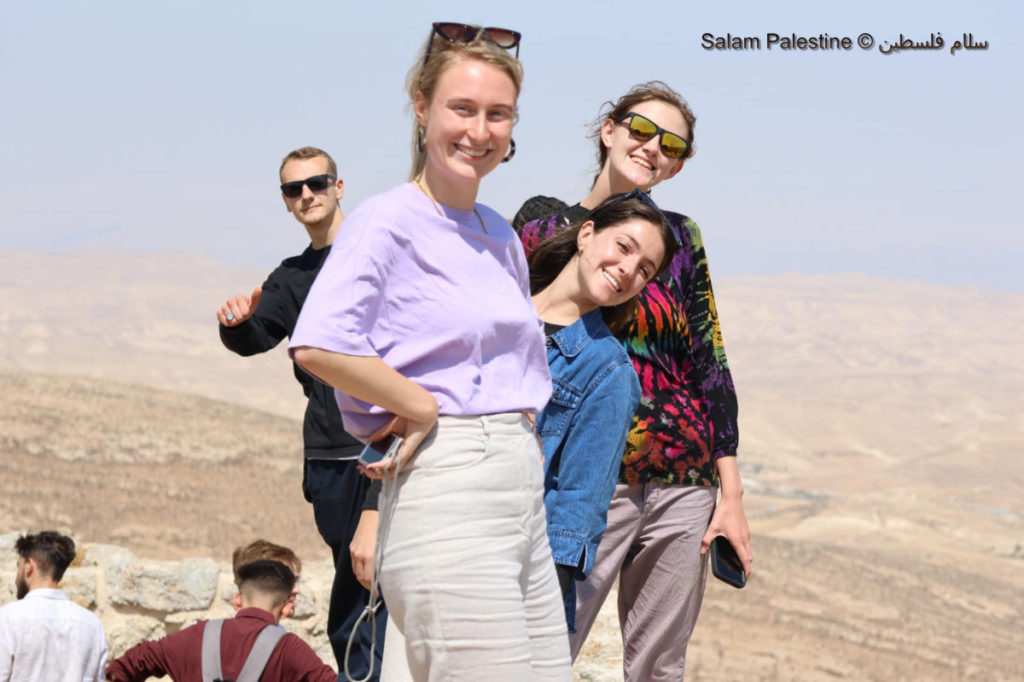
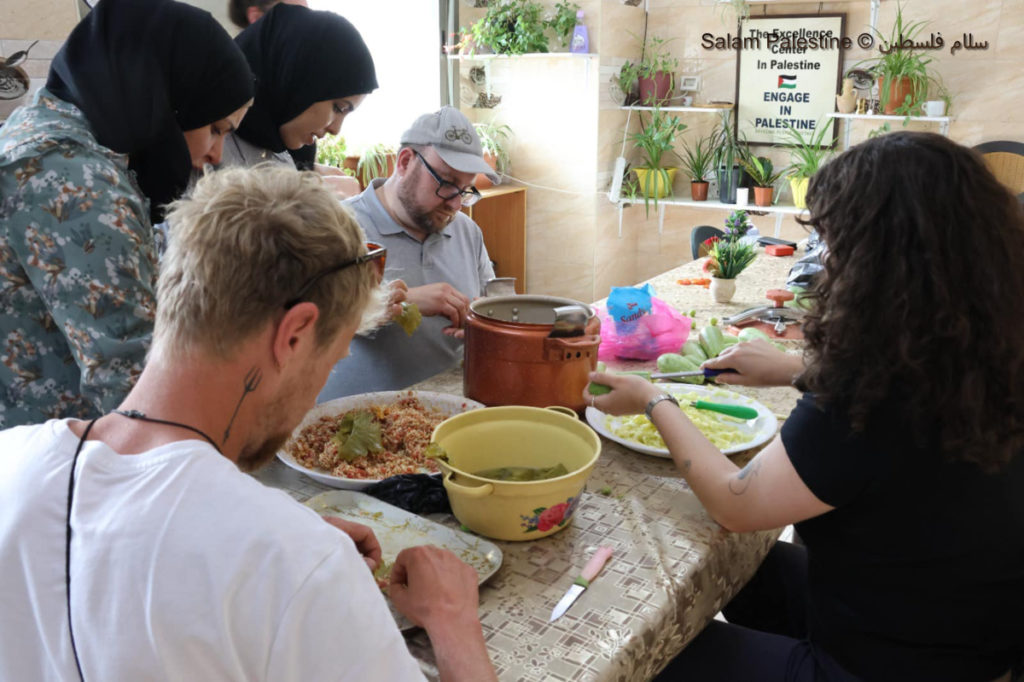
Staples of the Palestinian diet include bread, meat, rice, sauces, spices, soups, and desserts. Palestinian food culture is famous for its various pieces of bread, such as Taboon (sometimes called Laffah) flatbread and its unique white cheese, Jibneh Baide. This cheese is made from either goat’s or sheep’s milk and is renowned for its nutritious value and distinct flavor. Palestine is also famous for its meat dishes, which mostly consist of either chicken or goat. An example of a world-renowned Palestinian dish is Qidreh, made from rice, chickpeas, and chicken cooked in broth and various spices.
Not only will the center’s staff provide a traditional Palestinian breakfast every morning, but we will also occasionally cook dinner for all of the center’s members. This includes volunteers, interns, students, and staff. And, of course, the center’s staff know all the best places in town where you can grab a quick bite to eat!
Language, Literature And Oral Tradition
Palestine’s rich and diverse history also means that various languages are spoken within its borders. Arabic is the most widely spoken language, but there are also many English speakers and a small Hebrew-speaking minority.
The main style of Arabic spoken in Hebron is the Palestinian dialect, a subsection of the larger Levantine dialect, which is spoken by approximately 13 million people worldwide. Palestinian and Levantine Arabic are the dominant dialects throughout the region bordering the Mediterranean, including Syria, Lebanon, Jordan, and Palestine. Because of Palestine’s unique position at the center of the Levant, its dialect is widely spoken and understood throughout much of the Middle East and North Africa, as well as among the Arabic diaspora.
Palestine’s culture, particularly its oral tradition of poetry and music, has significantly influenced the construction of the Arabic language, especially regarding its grammar. With the founding of Islam, written Arabic has continued to evolve. When these two important influences, the oral and the Islamic, are combined, they ensure that Palestine is now a literary society. As a participant in the Palestinian Culture Program, you will be introduced to Palestinian poetry, music, and literature both at the center and throughout Palestine.
Religion In Palestine
As previously mentioned, Palestine is considered the Holy Land for three of the world’s largest religions: Christianity, Judaism, and Islam. In the West Bank and Gaza Strip, the majority of Palestinians are Muslim, though there is a sizable Christian minority as well as a smaller Jewish minority in the West Bank. Palestine also contains or is very near to many of the holiest religious sites in the world. For example, Bethlehem – the birthplace of Jesus – is located in the West Bank near the Palestinian-Israeli border.
Al-Aqsa Mosque, located in East Jerusalem, is the third holiest site in Islam and is widely recognized for its beauty and prestige. One of the most important religious and historical sites for both Muslims and Jews alike is the Masjid Al-Khalil, located in Hebron. Salam Palestine would be only too happy to show participants all these important cultural, religious, and historical sites in Palestine!
Palestinian Social Customs And Traditions
The people of Palestine are tightly knit and family-oriented and typically have large extended families. These families are often (but not always) patriarchal, meaning that a senior male figure leads them. As a rule, members of Palestinian families are pretty supportive of one another, with family members often taking on the role of caregivers to supplement any welfare gaps left by the state. In addition, members of the Palestinian diaspora working abroad send their earnings back to their families in Palestine, providing vital economic support for their loved ones at home.
Palestine has a highly educated population, and the public school system prioritizes reading, writing, science, and mathematics skills. As there is such a high demand for quality education, Salam Palestine offers additional educational support to the public school system in Hebron. For more information, please review our website under the “Volunteer Programs.”
Palestinian Arts And Music
Palestine is home to many widely recognized arts and crafts, including the art of olive wood carving, a technique associated with Bethlehem and famous for its depictions of religious scenes and figures. The city of Hebron is especially renowned for its glassblowing craftsmanship, while Gaza is known for its pottery and rugs. The art of henna, which became prominent after the rise of Islam due to the religion’s prohibition on tattoos, is especially noticeable in Palestine during festivals and local holidays.
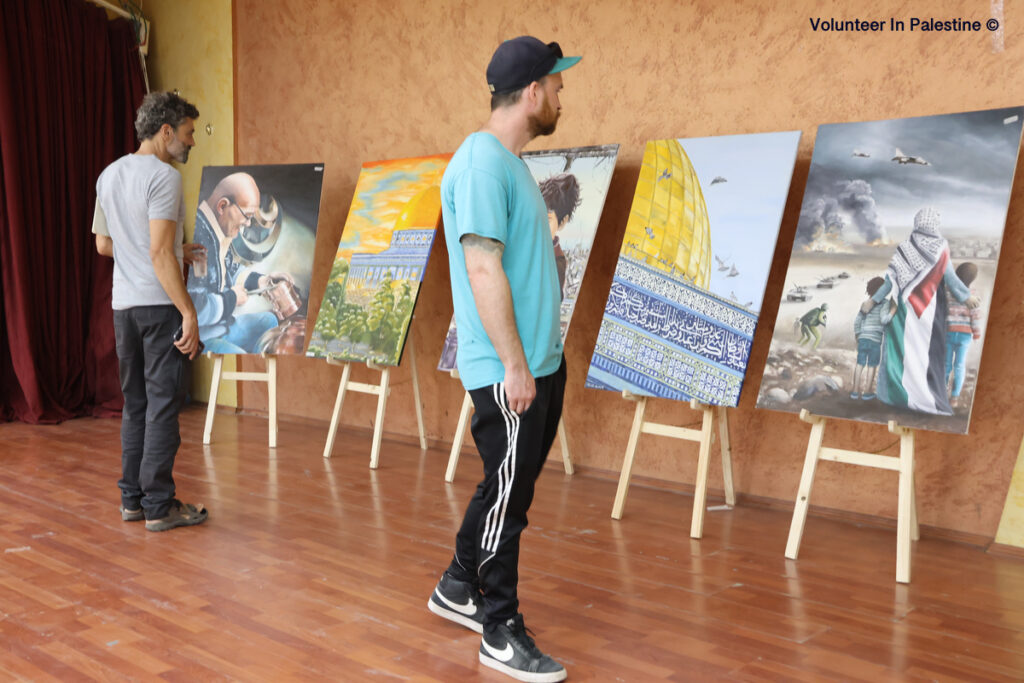
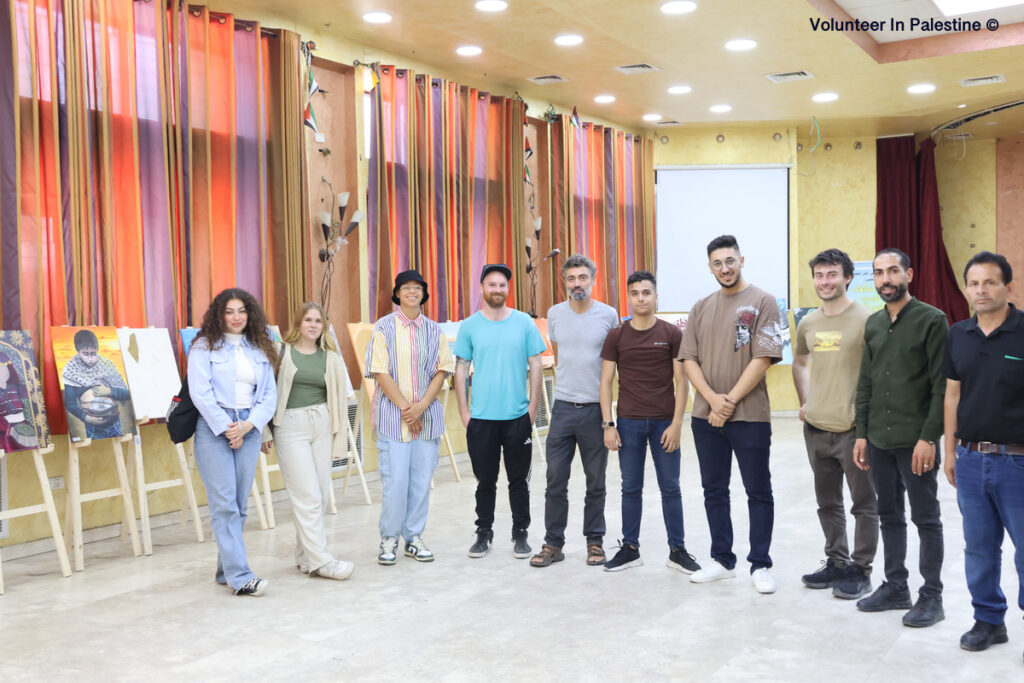
The performing arts are another key component of Palestinian culture, often depicting themes of cultural pride and national resistance when performed at public venues. Palestine is home to a unique form of dance called Dabke, traditionally performed at celebratory events such as weddings, festivals, and holidays. Salam Palestine actively participates in and contributes to local festivals and traditions and would be happy to include participants on such occasions.
Visit Palestine!
Palestine is an incredibly diverse nation, and its culture has been influenced by various civilizations and empires throughout history. Today, Palestine’s impact on world culture is distinguished by its influence on Arabic cuisine, art, and language. Of course, the aspects of its culture highlighted here have only scratched the surface of thousands of years of heritage.
Why not visit Salam Palestine in order to experience Palestine’s beauty first-hand among a people eager to connect with the outside world?
Benefits Of The Palestinian Culture Program
There are numerous benefits to enrolling in our Palestinian Culture Internship Program, including:
- 12 hours of complimentary Arabic lessons for each month that they are enrolled (3 hours per week)
- Participants may choose between Modern Standard Arabic (MSA) and Colloquial Arabic – either Levantine or Palestinian
- Accommodation with a Palestinian host family or in a shared dorm or apartment
- Complimentary breakfast in the center 6 times per week
- Center-led visits to various sites within the city of Hebron, such as the Old City, religious sites, refugee camps, and factories
- Engagement with the Palestinian community through Center-led activities and workshops
- Gaining an understanding of Palestinian human rights issues through day trips to refugee camps and Israeli settlements
- Opportunities to visit other cities and sites, including Bethlehem, Ramallah, Nablus, Hebron, Tulkarm, Qalqilya, Jenin, and the Dead Sea
- University credit
- Certificate upon completion of the program
Interacting With Palestinian Culture
Interns in Palestine will find that most Palestinians are incredibly friendly and open to foreigners. If participants utilize their Arabic skills, no matter how well-developed, they will find that most Palestinians are enthusiastic and patient communicators. They will be delighted that people are interested in their language and culture.
In addition, Palestine is located in the heart of the Levant (the area associated with the Eastern Mediterranean), providing ample opportunities to visit cultural sights, historical monuments, and many other landmarks. Although Palestinians can, at times, face difficult situations, participants will find that the Palestinian people are friendly and open and that Palestine, in general, is a safe place to visit!
Don’t Just Take Our Word For It!
If you have any doubts about the safety of Palestine—or, more specifically, Hebron—it might be reassuring to know that prior to the COVID pandemic, Salam Palestine welcomed around 80 interns each year. Since travel into the West Bank has recently resumed, we have seen a steady flow of participants to the center again.
You can hear from past volunteers about their experiences while volunteering with Salam Palestine under the descriptions of the various programs, as well as reading the testimony below from Archie, a volunteer from the UK:
“Throughout my stay in Palestine, I have felt completely safe as a male. I have never felt that I have been in danger. It is safer to walk through Hebron at night than it is to walk through Leeds in the UK.”
Who Can Participate?
Volunteers in Palestine do not discriminate based on nationality, ethnicity, religion, gender, sexual orientation, or any other basis. It has a long history of welcoming people from around the globe, from all walks of life, and all backgrounds and identities. All are welcome!
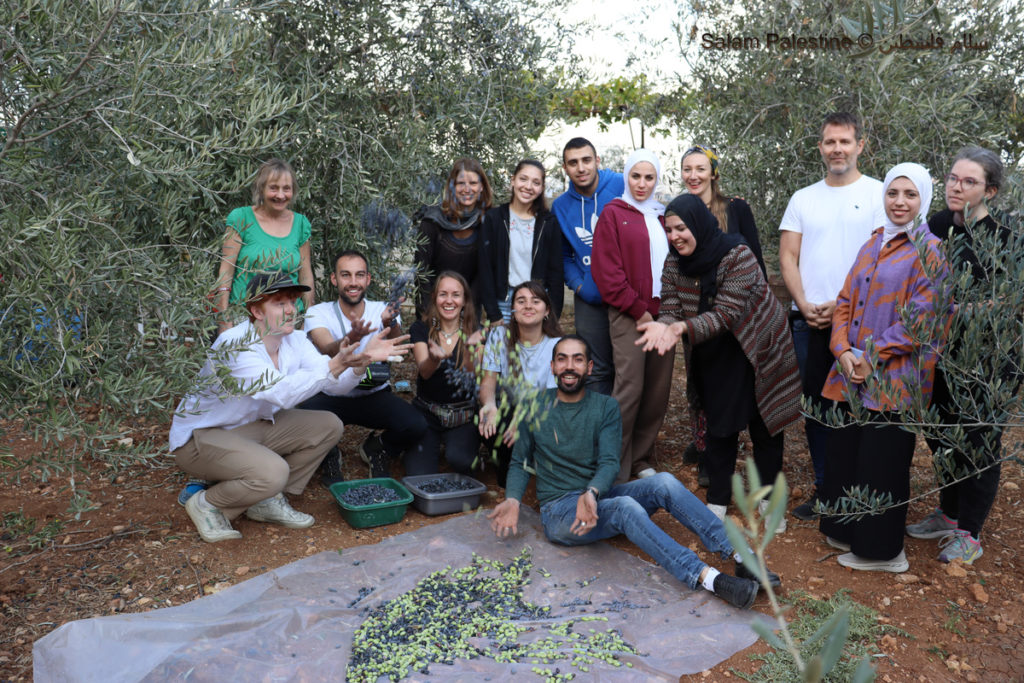
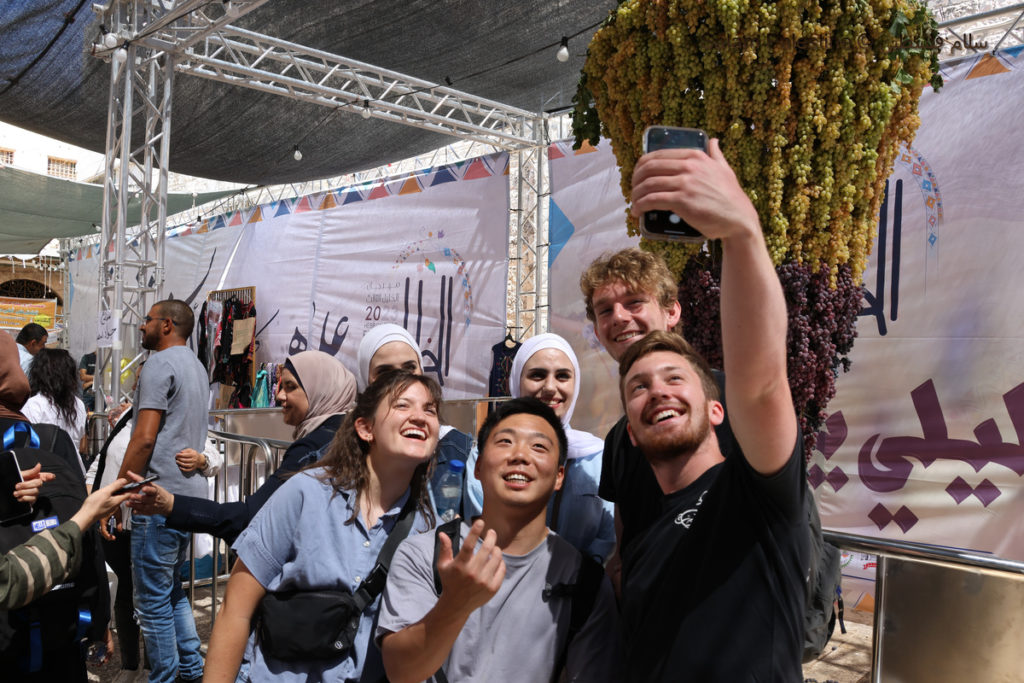
Previous participants on our programs have hailed from the following countries: Australia, Austria, Belgium, Brazil, Bulgaria, Canada, China, Croatia, Cyprus, the Czech Republic, Denmark, Estonia, Finland, France, Germany, Greece, Hungary, Ireland, Italy, Japan, Latvia, Lithuania, Luxembourg, Malta, Mexico, the Netherlands, New Zealand, Norway, Poland, Portugal, Romania, Singapore, Slovakia, Slovenia, South Africa, South Korea, Sweden, Switzerland, the United Kingdom and the United States!
While volunteering here, you will be part of a vibrant, talented, and passionate community. Interns in our program speak many languages, come from every corner of the planet, and have an incredible amount to offer. As an intern, you will have the chance to connect with people worldwide and build lifelong friendships with them. You will also have endless opportunities to network and build up professional contacts within Hebron.
Who Will Benefit?
This program will benefit those looking for a unique internship experience that will connect them with the culture and life of contemporary Palestine. It delves deeply into Palestinian history, politics, and humanitarian issues. This internship will suit students of Political Science, Archaeology, Linguistics, and other fields who are looking to pursue a summer internship or enhance their present studies. Anyone thinking of traveling through the Levant will undoubtedly benefit from the Palestinian Culture Program’s breadth and scope.
Are There Any Criteria For Participants?
There are only three criteria for participants. The first is conversational fluency in either of the program languages (English or Arabic). The second is that participants should be between the ages of 18 and 70, though exceptions can be made in special circumstances. Finally, we ask participants to have a positive attitude and an eagerness to learn.
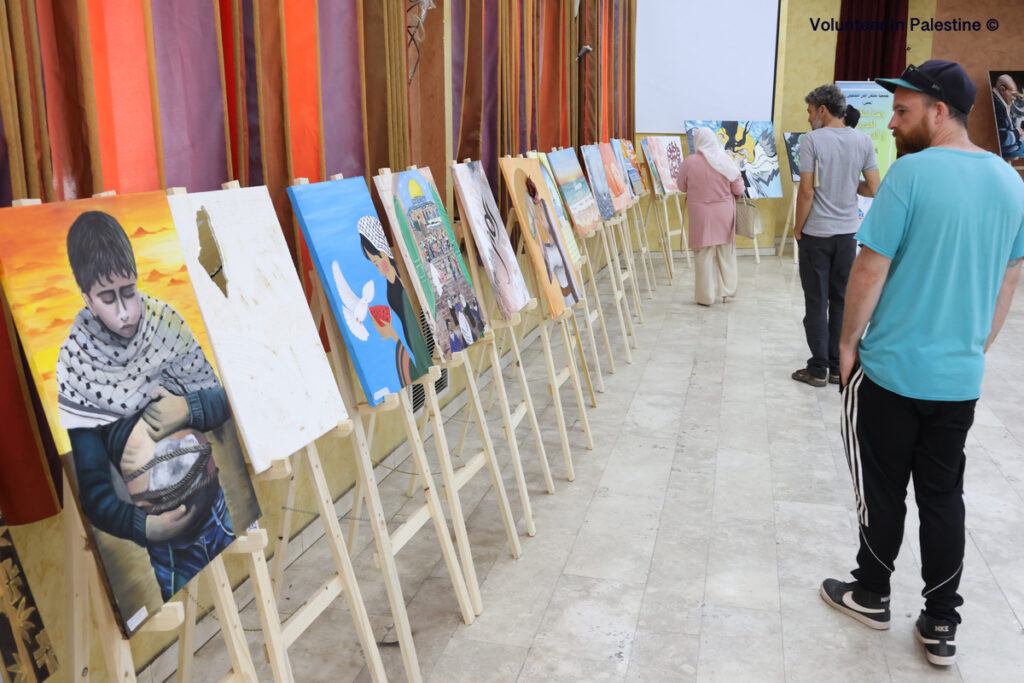
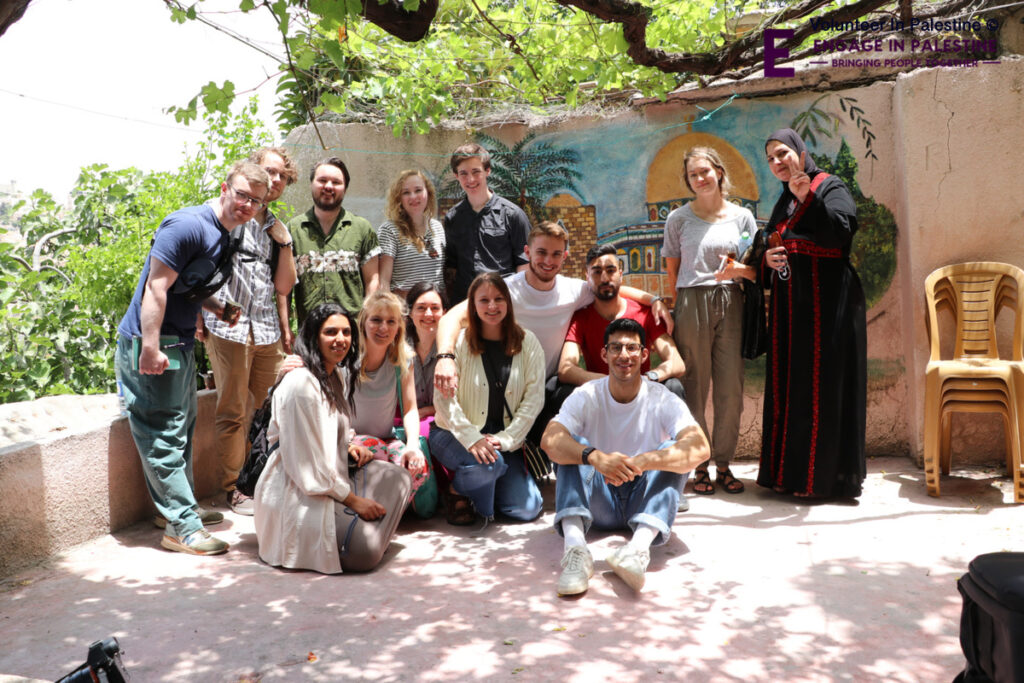
Participant Requirements:
- Colloquial fluency in English and/or Arabic
- 18-70 years of age (unless granted special permission by the Center’s Director)
- A positive attitude and an eagerness to learn
Traveling To Hebron
Reaching our center may entail much traveling, but it need not be arduous. Although there are some obstacles to be overcome when traveling to Hebron, Salam Palestine has compiled a list of all the resources you will need to reach us efficiently, safely, and practically.
Please read our articles below on planning your trip, flying to Palestine, the different routes to Hebron, and Israeli and Palestinian taxi services:
- How to fly to Palestine
- How to get to Hebron, Palestine
- Planning your trip to Palestine
- How to get from the Ben Gurion Airport (Israel) to Hebron
Program Costs And Information
Salam Palestine is priced competitively compared to other programs at 300 Euros per week. Program costs cover language courses, accommodation, complimentary breakfast each day that the participant is at the center, operating costs, and group excursions. No additional or hidden fees are applied to these programs, as the price quoted above is the complete and final cost that participants will pay.
Program Fees Cover:
- Accommodation
- Language courses
- Operating costs
- Complimentary breakfast
- Group excursions to Hebron
A Unique Experience
Although the center hosts volunteers from all over the world, many people are unaware of Palestine’s and the Levant’s diversity, having only a vague understanding of their timeless culture.
By enrolling in this internship program, participants will be taking part in a unique experience they will be sure to remember throughout their lives. Additionally, participants will have the opportunity to be fully immersed in the Arabic language and culture while living in Hebron.
In Which Language Is The Program Run?
All of our programs are geared toward English speakers. However, for the sake of immersion, the higher the course level, the less English will be utilized in the classroom. Additionally, students can use their Arabic skills to the best of their ability while traveling through Palestine, ensuring a fully immersive experience.
The Palestinian Culture Internship Program Overview
| Internship Program location | Hebron, Palestine |
| Program Fees | Check the prices here |
| Age | 18-70 years old |
| Duration of internship | 1-13 weeks |
| Housing Options | Host family A shared apartment Private (Additional fees apply) |
| Arabic language classes per week | 3 hours in total |
| Class duration | 45 Minutes |
| Number of participants per program | 1-5 |
| Internship Program Focus | Palestinian cultural immersion Human Rights in Palestine Political situation in the West Bank Daily life in Hebron |
| Start/End Dates | Flexible to fit participant’s schedule |
| Application Deadline | No deadline |
| University Credit | Available |
| Program Language | English and/or Arabic |
Reviews And Awards
Salam Palestine has been honored with several prestigious Community Awards and recognized as the Best Language School and Top Volunteer and Internship Program Provider for 2019, 2021, 2022, 2023, and 2024. For more details, please visit our profiles on GoOverseas.com and GoAbroad.com.
- +860 reviews (96%) on gooverseas.com
- +175 reviews (96%) on goabroad.com
- Participants’ video testimonials
Summary
The Palestinian Culture Internship Program in Hebron, West Bank, is designed to immerse its participants in the culture of Palestine, and in particular, that of Hebron. This will entail learning Arabic, venturing into the city to interact with local Palestinians, residing with a Palestinian host family (depending on availability), visiting critical cultural sights, learning about Palestinian cuisine and arts, participating in local festivities, and much more!
If you are seeking a career in or have an interest in social anthropology, Arab culture, human rights, or the political situation in Palestine, this internship will provide you with invaluable experience and insight into Palestinian culture and daily life.
How To Apply?
If you are interested in participating in our Palestinian Culture Program, please email us at Info@ecpalestine.org. We should be able to respond to your initial inquiry within 1-2 business days.
In the subject line of your email, write “The Palestinian Culture Internship Program.” Upon responding, we will attach an application form, which you will fill out and return to us to begin the process.
Find Us Online
Do you have questions about our work? Contact us:
Email: info@ecpalestine.org
WhatsApp:+972 599 479 880
Website: https://salampalestine.org/
EC Website: https://excellencenter.org/
Instagram: https://www.instagram.com/excellence.center
Facebook page: https://www.facebook.com/ExcellenceCenter
Facebook account: https://www.facebook.com/RafatECHebron
Watch us on YouTube: https://www.youtube.com/channel/UCsQSLdFZWZcBm6Uj0XMYuKg
Visit and Explore Palestine: https://www.facebook.com/ExplorePalestine
